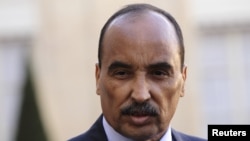DAKAR —
The Mauritanian government says President Mohamed Ould Abdel Aziz plans to return Saturday after a six-week stay in France to recover from what the government said was an accidental shooting by a soldier at a checkpoint.
Opposition groups in Mauritania say President Mohamed Ould Abdel Aziz’s prolonged absence was unacceptable and are calling for political transition in the coup-prone West African country.
The president went to France on October 14 after being wounded during what he later said was an accidental shooting outside the capital, Nouakchott.
Abdel Aziz told reporters Tuesday in Paris that he planned to return to Mauritania in the next few days.
The government said a Mauritanian soldier mistakenly shot at the president’s vehicle when it failed to stop at a checkpoint the evening of October 13. The soldier reportedly responsible for the shooting then went on national television to confirm the government version of events.
But rumors persist in Nouakchott that the incident was an assassination attempt, and that the president was perhaps more seriously wounded than reported.
Mauritanian business owner Souleimane Traore says many people do not really believe the account put forward by the government and think there is more to the story. Traore says the opposition insists that they need to know what really happened, but the question remains unanswered.
A coalition of 10 political parties, called the Democratic Opposition Movement, took to the streets of Nouakchott Wednesday to call on President Abdel Aziz to step down.
Matthew Burnard, a Mauritania analyst for the British consultancy firm Control Risks, says the opposition to date has lacked unity and organization, and recent events don’t appear to pose a short-term threat to political stability.
The long-term outlook, he says, is a different story.
“Politically, although Abdel Aziz’s position appears to be relatively stable for the time being, Mauritania’s political system depends on the political and military elites' belief that the president is the strongest man in the country. Basically, incumbent presidents in 2005 and 2007 were both removed in coups initiated by their military inner circles. So although Abdel Aziz looks to have ridden out this wave, there is still reason to believe that a coup could happen if there are signs that he is beginning to lose control," said Burnard.
Abdel Aziz returns as African leaders prepare for possible military intervention against Islamist groups in Mali linked to al-Qaida in the Islamic Maghreb.
The Mauritanian president has ordered cross-border military operations against the al-Qaida group in the past. Currently, though, he is calling for dialogue and a negotiated solution to the crisis in northern Mali.
Opposition groups in Mauritania say President Mohamed Ould Abdel Aziz’s prolonged absence was unacceptable and are calling for political transition in the coup-prone West African country.
The president went to France on October 14 after being wounded during what he later said was an accidental shooting outside the capital, Nouakchott.
Abdel Aziz told reporters Tuesday in Paris that he planned to return to Mauritania in the next few days.
The government said a Mauritanian soldier mistakenly shot at the president’s vehicle when it failed to stop at a checkpoint the evening of October 13. The soldier reportedly responsible for the shooting then went on national television to confirm the government version of events.
But rumors persist in Nouakchott that the incident was an assassination attempt, and that the president was perhaps more seriously wounded than reported.
Mauritanian business owner Souleimane Traore says many people do not really believe the account put forward by the government and think there is more to the story. Traore says the opposition insists that they need to know what really happened, but the question remains unanswered.
A coalition of 10 political parties, called the Democratic Opposition Movement, took to the streets of Nouakchott Wednesday to call on President Abdel Aziz to step down.
Matthew Burnard, a Mauritania analyst for the British consultancy firm Control Risks, says the opposition to date has lacked unity and organization, and recent events don’t appear to pose a short-term threat to political stability.
The long-term outlook, he says, is a different story.
“Politically, although Abdel Aziz’s position appears to be relatively stable for the time being, Mauritania’s political system depends on the political and military elites' belief that the president is the strongest man in the country. Basically, incumbent presidents in 2005 and 2007 were both removed in coups initiated by their military inner circles. So although Abdel Aziz looks to have ridden out this wave, there is still reason to believe that a coup could happen if there are signs that he is beginning to lose control," said Burnard.
Abdel Aziz returns as African leaders prepare for possible military intervention against Islamist groups in Mali linked to al-Qaida in the Islamic Maghreb.
The Mauritanian president has ordered cross-border military operations against the al-Qaida group in the past. Currently, though, he is calling for dialogue and a negotiated solution to the crisis in northern Mali.




